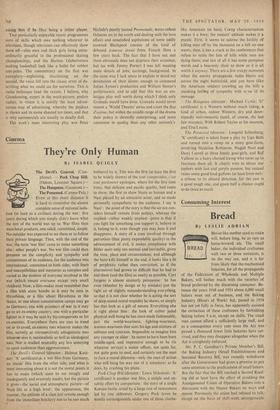Cinema
They're Only Human
By ISABEL QUIGLY
The Devil's General. (Cine- phone). — Pork Chop Hill. (Odeon, Leicester Square.)— The Hangman. (Gaumont.)— The Possessed. (Cameo-Poly.) EVEN at this short distance it is hard to remember the almost complete sense of national isola- tion (at least to a civilian) during the war : five years during which you simply didn't know what the rest of the world was up to. War films then were local products, one-sided, committed, simple. No outsider was expected to see them or to follow their private language. Then, with the end of the war, the term 'war film' came to mean something else: other people's war. No war film could then presume on the complicity and sympathy and commitment of its audience, for the audience was international, committed to both sides, with fears and susceptibilities and memories as complex and varied as the motives of everyone' involved in the war (which meant everyone except very small children). Now, a film-maker must remember that a film with atom bombs in it may be seen in Hiroshima, or a film about Hiroshima in the States, or one about concentration camps may go to Germany, one with prisoners of war in it may go to an ex-enemy country, one with a particular fighter in it may be seen by his compatriots or his ex-enemies. Everywhere there are toes to tread on or to avoid, ex-enemy toes whoever makes the film, secretly or retrospectively antagonistic toes whoever sees it, nationalistic as well as ideological toes. Nor is studied neutrality any less annoying to some audiences than aggressiveness.
The Devil's General (director : Helmut Kaut- ner; 'A' certificate)gis a war film from Germany, an 'inside' film from the other side; and what is most interesting about it is not the moral points it has to make (which seem to me smugly and inadequately and evasively made), but the picture it gives—the social and atmospheric picture—of Nazi life at a high level : the appearance, the manner, the attitude of a class just remote enough from the immediate butchery not to be too much bothered by it. This was the first (at least the first to be widely shown) of the tout comprendre,c'est tout pardonner apologies, where for the first time irony, that delicate and pacific quality, had room to show; the first to show Nazis as human and a Nazi played by an attractive actor, and so made personally sympathetic to the audience. I say 'a Nazi' : the point of the story is that the air ace con- siders himself remote from politics, whereas the implied—rather weakly implied—point is that if you fight for something you support it, believe in it, belong to it, even though you may hate it and disapprove. A story of a man involved through patriotism (that pretty expendable quality) in the advancement of evil, it makes compliance with Hitler seem only too normal and inevitable, given the time, place and circumstances; and although the hero kills himself in the end, it looks like a. fit of perplexity rather than conviction, as if the alternatives had grown so difficult that he had to end them (and the film) as neatly as possible. Curt Jurgens is almost sinisterly persuasive : he has even (whether by design or by mistake) just the right air of slightly misunderstanding everything, so that it is not clear whether he is acting the sort of deep-seated moral stupidity he shows, or simply has that look as a gift of nature. Everything else is right about him : the look of rather jaded physical well-being he has since made fashionable, just the world-weariness, . fighting-weariness, women-weariness that suits his age and mixture of softness and cynicism. Impossible to imagine him any younger or older : he stems to have been born middle-aged, and impressive enough to be (in whatever service) a senior officer, not quite fat, not quite gone to seed, and certainly not the man to face a moral dilemma—only the man of action who will bang his way out of it somehow; as he does, by crashing his plane.
Pork Chop Hill (director : Lewis Milestone; 'A' certificate) is another war film, a simple and un- subtle effort by comparison : the story of a single Korean battle, acted by a large cast of newcomers led by one oldcomer, Gregory Peck (even he mostly unrecognisable under one of those cloche- like American tin hats). Corny characterisation makes it a bore; the makers' attitude makes it a puzzle. First, it seems to satirise the futility of killing men off by the thousand on a hill no one wants; then, it has a crack at the conferences that refuse to settle the fate of hills while men are dying there; and last of all it has some pompous words and a heavenly choir to show us it is all worth it anyway. There are a few creepy moments when the enemy propaganda radio blares out across the night battlefield, and you have (like the American soldiers crawling up the hill) a sneaking feelitig of sympathy with sclie of its message.
The Hangman (director : Michael Curtiz; certificate) is a Western without much riding, a kind of urban, indoor Western, dry and deter- minedly anti-romantic (until, of course, the last few minutes). With Robert Taylor at his meanest, and Tina Louise.
The Possessed (director: Leopold Schlosberg; 'X' certificate) is taken from a play by Ugo Betti and turned into a romp on a stony goat-farm, involving Madeline Robinson, Magali Noel and Deny Carrell as three lonely goat-girls, and Raf Vallone as a hairy-chested tramp who turns up to fascinate them all. It clearly tries to shiver our timbers with lust and purple passion, but instead raises some goodioud guffaws (at least from me): a tribute to its absurd direction, for the cast is a good tough one, and given half a chance ought to do twice as much.














































 Previous page
Previous page